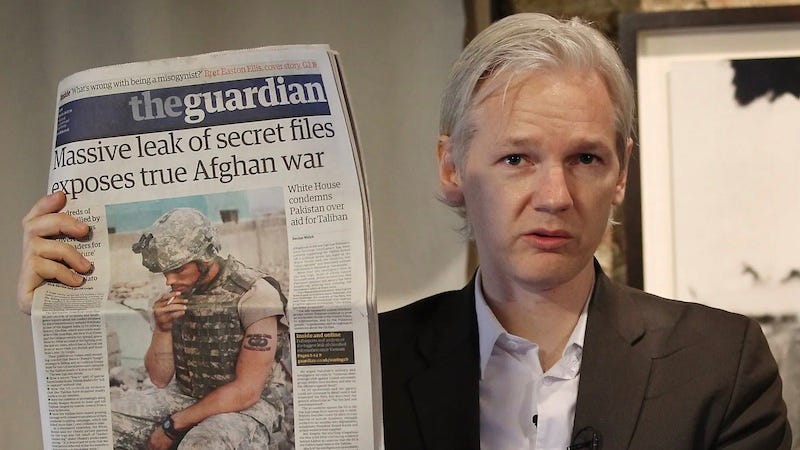Julian Assange released: The tumultuous journey from Belmarsh to freedom
Assange’s release still leaves unresolved questions about the balance between national security, individual rights, and the role of government in policing the boundaries of information and secrecy.
Julian Assange’s release from Belmarsh Jail marks a significant chapter in the tumultuous history of modern geopolitics and journalistic freedom. After over five years of incarceration, Assange’s freedom was secured through a plea bargain with the United States government and under the terms of the agreement, Assange pled guilty to a single espionage charge but was credited for the time already served at Belmarsh, after which, he will be free to return to Australia.
This resolution is largely the work of relentless efforts by various supporters – from his family and Stella Assange, to activists, legal practitioners and political figures. Despite criticisms levied at the Albanese government for its perceived inaction, it, along with the preceding Morrison government, engaged in behind-the-scenes diplomacy that ultimately contributed to Assange’s release. This outcome highlights the precarious nature of the work performed whistleblowers, journalists and publishers, and the risks they face in shedding light on the more nefarious operations of supposedly democratic regimes.
The events leading up to Assange’s release were propelled by a mixture of legal battles and political advocacy over the recent months: in February 2024, independent MP Andrew Wilkie introduced a motion in Parliament calling for an end to the British and American governments’ prosecution of Assange and this motion, advocating for his return to Australia, emphasised the urgent need for intervention, as Assange faced the imminent threat of extradition – and possible execution – in the United States, a scenario that had severe implications for journalistic freedom globally.
Wilkie’s passionate plea in Canberra at the time illustrated the dire situation: Assange, a Walkley award-winning journalist, was just a few hours from potential extradition, highlighting the dangers faced by journalists under the scrutiny of powerful foreign entities. The successful passage of Wilkie’s motion, despite opposition from figures such as Peter Dutton and the broader Liberal Party, signified a bipartisan recognition of the need to address Assange’s prolonged legal ordeal.
The broader political and diplomatic landscape, including the intricacies of the AUKUS deal, provided a complex backdrop to these efforts. The Labor Party, despite its limited public action on this matter, was believed to be working behind the scenes – there is a fine balance between national security interests and the imperative to protect freedom of expression and press freedom. While it was outrageous that Assange was charged in the first place and incarcerated for so long, at least justice has now prevailed.
A beacon of hope in the legal quagmire
In May 2024, a glimmer of hope emerged for Assange when he was granted the right to appeal his extradition to the United States. This development, although a minor legal victory, highlighted the complexities surrounding his case. Stella Assange, in a poignant address, articulated the fatigue and desperation felt by Assange’s family and supporters, urging the United States to abandon what she described as a “shameful attack on journalists and the press”. Her words at the time resonated with a broader call for justice, highlighting the protracted nature of Assange’s legal ordeal, which had not only been a personal struggle but had also become emblematic of wider concerns about press freedom and governmental accountability.
Assange’s right to appeal at the time was based on the ability to challenge United States assurances concerning freedom of speech protections under the U.S. Constitution, the absence of prejudice at trial due to his nationality, and the assurance that the death penalty would not be imposed. These legalities highlighted the severe implications of his potential extradition, where federal law in the U.S. still permits the death penalty under certain conditions, including for non-citizens.
The slow progression of Assange’s case mirrors the treatment of other whistleblowers by their respective governments, highlighting a pattern of reluctance to intervene in such prosecutions. For instance, the Australian government’s handling of David McBride, who faced legal repercussions for his actions as a whistleblower and is now in jail, reveals a hesitancy to halt prosecutions even when the power to do so lies within the government’s control. The case against whistleblower Richard Boyle continues, and the federal government dismissed his appeal to be protected under the Public Interest Disclosure Act last Friday. How is this behaviour by the federal government in the public interest?
This inconsistency in protecting journalists and whistleblowers raises questions about the real commitments of governments to freedom of speech and the right to expose governmental malfeasance.
The broader implications of Assange’s legal battle reflect on the ideological inconsistencies within the United States itself. The Supreme Court’s treatment of the Constitution as a series of “loosely applied suggestions” rather than the bedrock of American law has significant repercussions for freedom of speech – a foundational element of democratic governance. Assange’s actions, which involved publishing documents deemed to be in the public interest, have brought him into the firing line of a system seemingly insecure about its own transparency and accountability.
The portrayal of Assange in the media and by politicians while he was in Belmarsh jail and previously in the Ecuadorian embassy in London – as disorderly or uncooperative – often sidestepped the fundamental issues at stake: the right to publish uncomfortable truths about government operations. This diversion from substantive debate to personal attacks turned Assange into a martyr for free speech, ironically at the hands of two countries that pride themselves as bastions of freedom, yet do little to support this, when the opportunity arises.
A turning point in international justice?
The release of Assange could mark a critical – albeit slow – turning point in international justice and government transparency. While his freedom is a victory for his supporters, and obviously, Assange, the underlying dynamics between the Australian and United States governments reveal an often frustrating story of international relations and diplomacy.
Throughout Assange’s incarceration, there was continuous speculation and criticism regarding the extent and efficacy of the Australian government’s diplomatic efforts. As a staunch ally of the United States, and seemingly having substantial leverage – highlighted by treaties like ANZUS, collaborations such as the AUKUS agreement and spying and security operations at Pine Gap – Australia should have worked harder to release Assange from prison many years ago. Despite these diplomatic connections, the lack of forceful advocacy from Canberra has raised questions about its commitment to protecting its citizens abroad, particularly those involved in contentious issues like Assange.
Assange’s situation, when compared with other international cases, also provides a hazy picture of inconsistency. For instance, the Australian government has successfully negotiated the release of its citizens from places as challenging as Chinese detention – for example, the Australian journalist Cheng Lei in 2023 – yet struggled to exert influence in London and Washington, where it arguably holds more sway. This inconsistency shows a reluctance to engage in tough diplomacy with its closest allies, even in cases involving the fundamental rights of an Australian citizen. This systemic issue points to a deeper malaise within Australian diplomacy, one of double standards and doublespeak when it comes to handling cases that might embarrass the government or expose uncomfortable truths.
The long-term implications of Assange’s ordeal are profound and his case became emblematic of the struggles faced by those who seek to expose governmental overreach and misconduct. It’s astonishing to look back at case of Assange and consider the global community’s failure to protect freedom of speech and the press – the fundamental pillars of supposedly democratic societies. In this sense, the United States and Britain – and to a lesser extent, Australia – have failed dismally.
As Julian Assange returns to Australia, his story remains a potent symbol of resistance against the encroachments of authoritarian practices within democratic governments. The relief of his release does not mitigate the troubling precedents set by his case; if anything, it serves as a reminder of the ongoing battles for transparency and justice in an increasingly interconnected world. This saga, while ending with Assange’s release, still leaves unresolved questions about the balance between national security, individual rights, and the role of government in policing the boundaries of information and secrecy.










